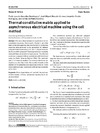Identificador persistente para citar o vincular este elemento:
https://accedacris.ulpgc.es/jspui/handle/10553/41461
| Título: | Thermal constitutive matrix applied to asynchronous electrical machine using the cell method | Autores/as: | González Domínguez, Pablo Ignacio Monzón-Verona, José Miguel Simón Rodríguez, Leopoldo De Pablo Sánchez, Adrián |
Clasificación UNESCO: | 3322 Tecnología energética | Palabras clave: | Finite formulation Cell method Thermal constitutive matrix 3-D heat tansmission models Finite elements method |
Fecha de publicación: | 2018 | Publicación seriada: | Open Physics | Conferencia: | 18th International Symposium on Electromagnetic Fields in Mechatronics, Electrical and Electronic Engineering (ISEF ) | Resumen: | This work demonstrates the equivalence of two constitutive equations. One is used in Fourier's law of the heat conduction equation, the other in electric conduction equation; both are based on the numerical Cell Method, using the Finite Formulation (FF-CM). A 3-D pure heat conduction model is proposed. The temperatures are in steady state and there are no internal heat sources. The obtained results are compared with an equivalent model developed using the Finite Elements Method (FEM). The particular case of 2-D was also studied. The errors produced are not significant at less than 0.2%. The number of nodes is the number of the unknowns and equations to resolve. There is no significant gain in precision with increasing density of the mesh. | URI: | https://accedacris.ulpgc.es/handle/10553/41461 | ISSN: | 2391-5471 | DOI: | 10.1515/phys-2018-0005 | Fuente: | Open Physics [ISSN 2391-5471], v. 16, p. 27-30 |
| Colección: | Artículos |
Citas SCOPUSTM
3
actualizado el 08-jun-2025
Citas de WEB OF SCIENCETM
Citations
3
actualizado el 12-ene-2026
Visitas
157
actualizado el 27-sep-2025
Descargas
119
actualizado el 27-sep-2025
Google ScholarTM
Verifica
Altmetric
Comparte
Exporta metadatos
Los elementos en ULPGC accedaCRIS están protegidos por derechos de autor con todos los derechos reservados, a menos que se indique lo contrario.
